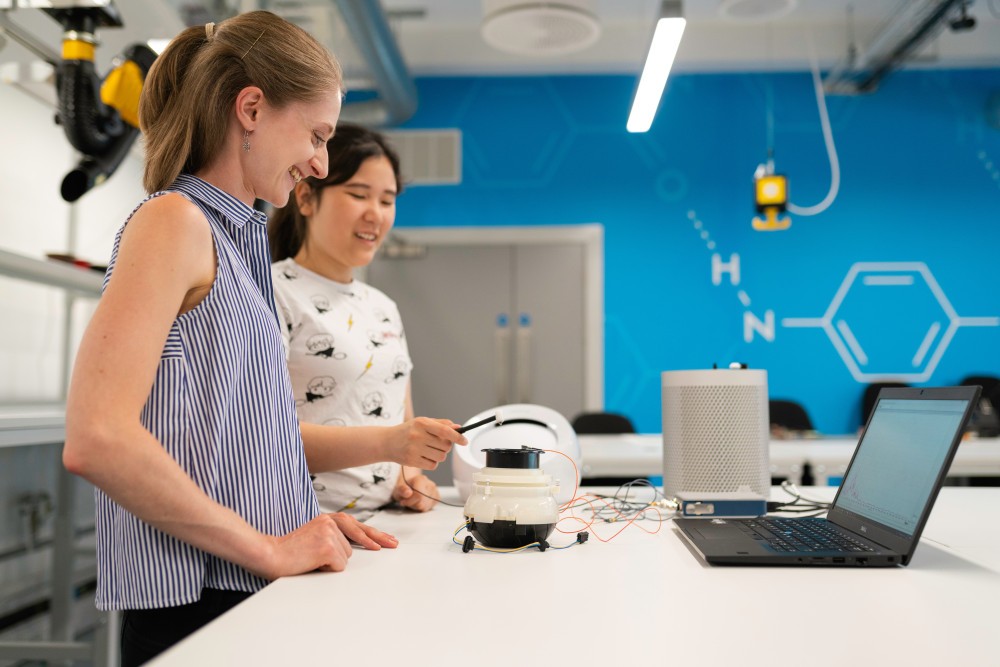Space: a place for equal opportunities

Much has been written about the participation of women in the STEM disciplines (Science, Technology, Engineering, and Mathematics), and about the importance of increasing their involvement as a way to drive innovation and confront the major challenges society is facing, such as the need to achieve the Sustainable Development Goals.
In Portugal, the Citizenship and Gender Equality Commission reports that “women represent 38% of bachelor’s degree graduates in the STEM disciplines” in that country, and that “the proportion of women employed in STEM jobs in Portugal is now 44%”.
Although these Portuguese statistics regarding the STEM disciplines are encouraging, and in fact higher than the European average, the challenges we still need to address are even greater when we consider fields in the area of Information and Communication Technologies (ICT). The official statistics from Europe show that in 1999, 26% of those earning degrees in ICT fields were women, but this proportion then dropped to 18% in 2009, before rebounding a bit to 21% in 2019. A similar trend is seen in Portugal, although with figures that remain below the European averages. In the ICT fields, as well as in engineering, there are still cultural and social barriers that continue to make these areas a predominantly male environment. The number of women interested in pursuing careers in these fields, whether measured as those enrolled in university programs or those working in the industry or as entrepreneurs, continues to be far below the targets set, and this trend was recently confirmed in a 2021 study by the European Commission entitled She Figures.
In the space industry, which has traditionally been attractive for young people as well as adults, jobs are being generated in the STEM disciplines for highly qualified, multidisciplinary workers (in Europe, 75% of these employees have at least one academic degree), with an ongoing need for workers with ICT backgrounds. This makes this an industry that can help create momentum to attract more young people into these areas.
A recent study commissioned by the European Space Industry Association (EUROSPACE) shows that there is a lack of human resources in the space industry, even though the overall availability of qualifications and training programs in and for that industry is considered to be adequate. This lack of human resources may become even more significant, since it is predicted that 7 million new jobs will be created in the space industry between now and 2025. In view of this, there is clearly a need to explore other more innovative and effective ways of attracting and retaining talent.
This high level of demand in the market also represents an excellent opportunity, and this is why it is essential to work on expanding the hiring base for the space industry.
In general, greater efforts have been made to attract girls and women in these areas, by encouraging them to take on this challenge. Companies have shown a great willingness to participate in these efforts as well, once they recognize the potential for significantly increasing their pool of job candidates.
However, there is still a long road to travel, with a need to create inspiration and a passion for space among the younger generations, and particularly among young women. This is where a major commitment to equality needs to begin. It is essential for all companies operating in this market to encourage young women to get involved in the STEM disciplines, in collaboration with other sources in the community, especially schools. GMV is playing an active role for making progress in this area. In Portugal, we have been working consistently with institutions and initiatives that are notable for their increasing efforts to raise awareness about the industry. For example, organizations such as Ciência Viva and ESERO have made a contribution to closing this “gender gap” from an early age, by generating enthusiasm for science and space. Elsewhere in Europe, the organization Women in Aerospace Europe (WIA‑E), of which GMV is a member, has been actively committed to enhancing interest in space ever since it was founded in 2009. It also encourages more inclusive representation of women throughout the aerospace industry, by giving them more visibility, encouraging their advancement in the areas of science and technology, and raising awareness about the fundamental role that space plays in our everyday lives. Another excellent example of how GMV has been involved in achieving this global ambition is the company’s participation in the challenge events presented by the ASTI Foundation, which is a leading international organization in terms of training and development for digital talent.
It is clear that GMV, as a leading technology group, wants to help address the various gaps that still exist in relation to gender equality in the professional world, by adopting strategic positions to promote inclusion and diversity. In this context, initiatives involving the STEM disciplines are always highly valued, such as those involving school visits to the company’s facilities, mentorship programs for young female engineers, and policies designed to improve the work-life balance with flexible work hours and remote work opportunities.
In view of the fact that the space industry in Europe still consists primarily of men (about 75% of all employees, according to data from WIA‑E), it is important to remember that we really have been making progress in terms of female participation, even though change can be slow and the statistics demonstrate that there is still much to be accomplished.
Teresa Ferreira
GMV’s Manager of Satellite Navigation in Portugal